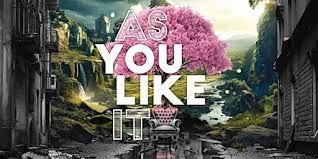in which we do not say "mycelial network"
on program notes, As You Like it, and "sporecore"
Like the blurb or poetry reading introduction or product review for that matter, the program note is a funny and ephemeral form, one that doesn’t just consider audience and tone but is written, quite literally, for the specific audience of the theatrical (or dance, or symphony, or opera) production at hand, an audience that necessarily includes donors and staff. Blink and you will miss it. The program note can be many things: pro forma, cliche, surprisingly thoughtful. There are things it cannot say and things it must. It marks a moment and disappeared. It gets recycled at the end of the night. If you didn’t see Best Available last spring, for instance, you wouldn’t know to go look for Sarah Rose Leonard’s timely dramaturgical notes, “The Briefest History of Regional Theater” (thoughtfully archived on the Shotgun Players website.) Now that we think about it, the program note is way more ephemeral than the blurb even, which can sometimes become iconic. Program notes, when they survive, generally do so in archives.
It’s the beginning of the semester so the one of us who teaches writing is thinking about things like genre and audience. The other one is in tech rehearsals for As You Like It, which opens this weekend. We crashed into each other in the kitchen last night at 2 am: Clive washing dishes after he got home, Stephanie stumbling to the bathroom after being woken by thoughts about an assignment for her class.
In the spirit of iteration and making nests for ephemera, the title of Clive’s program note for As You Like It, pasted in below, borrows the same line that we used for our most recent post on this substack. You will notice that he does not say mycelial network, but perhaps you will feel the gist. The popularity of a mycorrhizal framework is something we keep thinking about. We’ve bookmarked the Triple Canopy “Sporecore” essay folio which poses a good question: “What to make of the widespread fetishization (and commodification) of mushrooms, and the role of culture in shaping and spreading mycotopianism?” Whatever the rhetoric of the mushroom may be, it is not the same as empathy, the animating figure that has dominated US arts discourse and funding for the last decade at least.
Of course there’s no reason that mycelial network couldn’t have appeared in these notes (and perhaps it would have been canny to include.) It is curious to consider that no matter how omnipresent the idea of the mushroom or “mycotopianism” may be in contemporary cultural representations, a more embodied (collective, ceremonial, transformative) orientation to the fungal, particularly the psychedelic, remains way out of bounds when it comes to cultural institutions, a legal and insurance nightmare. We could imagine a paired foraging walk for chanterelles, but if the weather was right for that, then it would be way too wet to produce a play or concert on stage.
Anyways, as Clive points out, Shakespeare said it first: “here we find tongues in trees, books in the running brooks, sermons in stones, and good in everything.”
Here’s the program note. Hope to see you there.
I like this place and willingly could waste my time in it.
— Celia, Act II, scene 4
I do like this place, in fact, I love it and have willingly “wasted” over 20 years here as a member of the Cal Shakes family. I first stepped foot on the grounds in 1993 to see, of all things, a production of As You Like It that happened to feature a certain Elizabeth Carter in the role of Audrey! ***
My experience that night in 1993, and hundreds of nights since, is the reason I chose this title for our 50th Anniversary production. The story at the heart of As You Like It reflects the experience of attending a show at the Bruns. We leave behind the constrictions of our workaday lives and enter the natural world, where the usual rules and expectations do not apply and the unexpected can happen. In the forest of Arden or here, in Siesta Valley, on protected watershed land, we come to understand that we are more related than we are separate. When we laugh together, tap our toes to the music, or wipe our eyes at a particularly poignant moment, our shared experience brings us together. No matter what the person next to us looks like or where they come from, no matter who or how they love, what they vote for or where they worship, for a brief instance we are united. We live today in a world of relentless divisions, the consequences of which are dire, and are in desperate need of finding ways to connect across our differences. We believe that this place and these stories, told to us by this amazing group of 100% Bay Area local artists, help us move towards greater kinship.
As You Like It celebrates 50 years of Cal Shakes history. This institution provides a profound example of what an inspired group of individuals dedicated to a common cause can achieve. Our goal is simple: for this place to continue to thrive and to offer illuminating experiences for your children’s children. Join us in celebration for here we find tongues in trees, books in the running brooks, sermons in stones, and good in everything.
Gratefully,
Clive Worsley
Executive Director
*** Elizabeth Carter is directing the 50th anniversary production of As You Like It, a play she acted in 30 years ago on the same stage.




